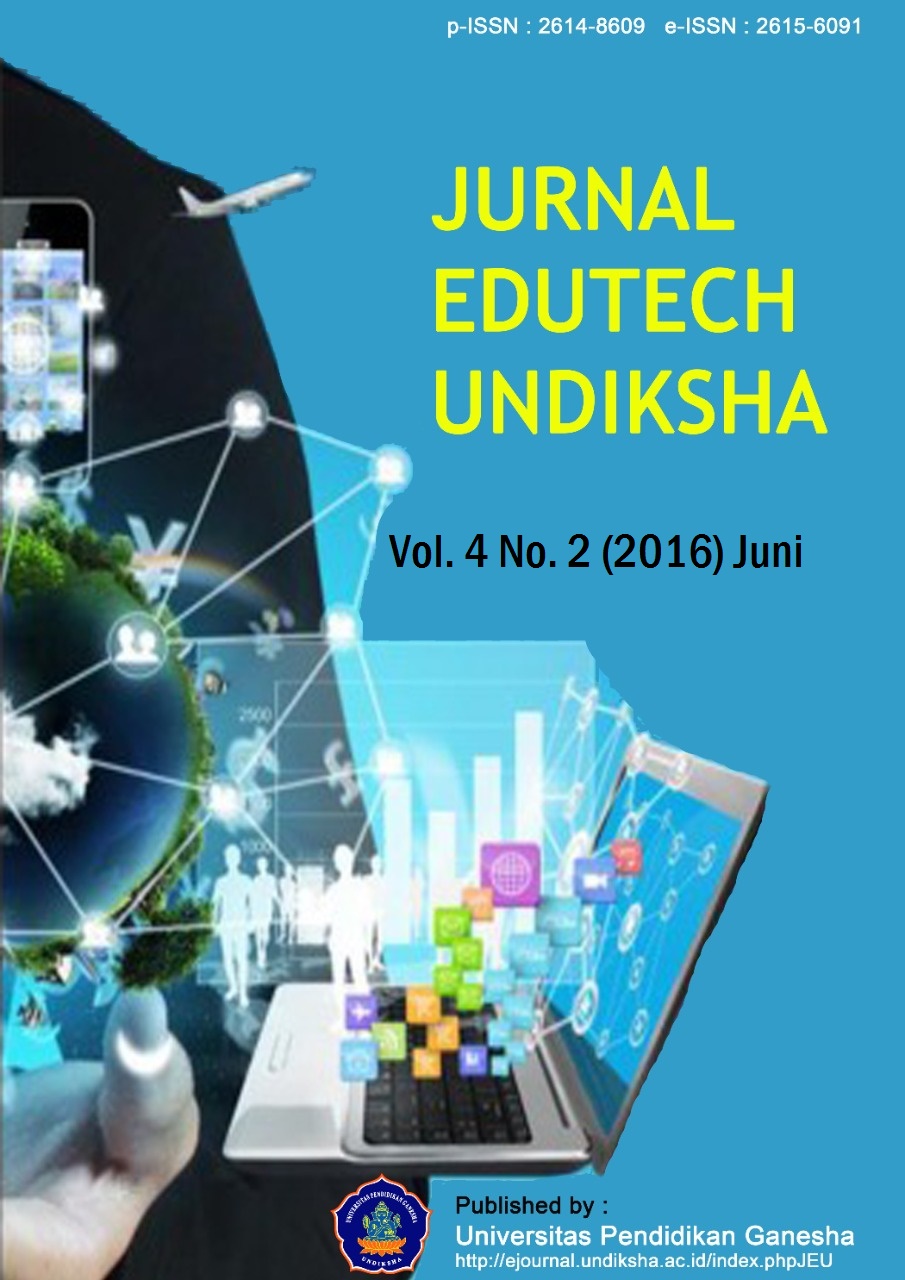PENGEMBANGAN VIDEO PEMEBELAJARAN IPA KELAS VI DI SD N 2 BANJAR BALI TAHUN 2015/2016
DOI:
https://doi.org/10.23887/jeu.v4i2.7631Abstract
Rata-rata nilai pelajaran IPA yang diperoleh oleh peserta didik yaitu 71 dengan KKM 75. Rendahnya rata-rata nilai tersebut diduga disebabkan kurangnya penggunaan media video dalam pembelajaran. Oleh karena itu penelitian ini bertujuan untuk (1) mendeskripsikan rancang bangun pengembangan video pembelajaran IPA, (2) mengetahui kualitas pengembangan video pembelajaran IPA, (3) mengetahui efektifitas pengembangan video pembelajaran IPA. Penelitian ini merupakan penelitian pengembangan dengan menggunakan model ADDIE (analyze, design, development, implementasi, evaluation). Validasi video pembelajaran dilakukan oleh ahli isi pembelajaran, ahli desain pembelajaran, ahli media pembelajaran, uji coba perorangan, uji coba kelompok kecil, dan uji coba lapangan. Efektivitas video pembelajaran dilakukan oleh 30 orang siswa menggunakan desain penelitian pre-test dan post-test. Data dikumpulkan dengan metode kuesioner, tes dan wawancara dengan instrumen lembar kuesioner, tes objektif dan pedoman wawancara. Hasil dari penelitian ini adalah: (1) Pengembangan video pembelajaran dikembangkan dengan model ADDIE melalui 5 tahapan yaitu menetukan user, merancang naskah, melakukan shooting, menerapkan produk, dan melakukan evaluasi. (2) Validitas pengembangan video pembelajaran menurut review para ahli diperoleh asil sangat baik dengan presentase tingkat pencapain ahli isi 92%, ahli desain pembelajaran 92% dan ahli media 90%. Berdasarkan hasil ujicoba produk diperoleh hasil yang sangat baik dengan presentase uji perorangan 94,66%, uji coba kelompok kecil 94,5% dan uji coba lapangan 95,04%. (3) Efektivitas hasil pengembangan media video pembelajaran menunjukkan signifikansi yang diperoleh adalah = 17,149 > = 2,002. Ini berarti media video pembelajaran efektif dalam meningkatkan hasil belajar siswa.Kata Kunci : IPA, pengembangan, video pembelajaran
The average value of science subjects acquired by learners at 71 to 75. The low KKM average value was allegedly due to lack of use of video media in learning. Therefore, this study aims to (1) describe design of the development of science video learning, (2) determine the quality of the development of science video learning, (3) determine the effectiveness of the development of science video learning. This study is a research and development study that used ADDIE (analyze, design, development, implementation, evaluation) model. The validation of the learning video was done by a learning content expert, an instructional design expert, a media learning expert, 3 individual testing students, 12 students in small group trial, and 25 students in field trials. Pre-test and post-test were used to test the effectiveness of the instructional video performed by 30 students. The data were collected through questionnaires, tests and interviews with questionnaire sheets, objective tests and interview guidelines. The data analysis used was a qualitative descriptive analysis, quantitative and inferential statistic. The results of this study are : ( 1 ) Development of learning videos developed by the model ADDIE through 5 stages that determine the user , draft a text , do the shooting , applying products, and evaluating . ( 2 ) The validity of the development of learning videos obtainable according to the review experts acyl very well with a percentage level of achievement content expert 92 % , 92 % instructional design experts and media experts 90 % . Based on product test results obtained excellent results with a percentage of 94.66 % of individual tests , small group trial of 94.5 % and 95.04 % field trials . ( 3 ) The effectiveness of the development of instructional video media indicate significance obtained is = 17.149 > = 2.002 . This means learning video media effective in improving student learning outcomes .
keyword : science, development, video learning.
Published
2016-07-19
How to Cite
., I. P. A. P., ., D. I. M. T. S. M., & ., P. D. A. A. G. A. (2016). PENGEMBANGAN VIDEO PEMEBELAJARAN IPA KELAS VI DI SD N 2 BANJAR BALI TAHUN 2015/2016 . Jurnal Edutech Undiksha, 4(2). https://doi.org/10.23887/jeu.v4i2.7631
Issue
Section
Articles
License
Authors who publish with the Jurnal EDUTECH Undiksha agree to the following terms:
- Authors retain copyright and grant the journal the right of first publication with the work simultaneously licensed under a Creative Commons Attribution License (CC BY-SA 4.0) that allows others to share the work with an acknowledgment of the work's authorship and initial publication in this journal.
- Authors are able to enter into separate, additional contractual arrangements for the non-exclusive distribution of the journal's published version of the work (e.g., post it to an institutional repository or publish it in a book), with an acknowledgment of its initial publication in this journal.
- Authors are permitted and encouraged to post their work online (e.g., in institutional repositories or on their website) prior to and during the submission process, as it can lead to productive exchanges, as well as earlier and greater citation of published work. (See The Effect of Open Access)








